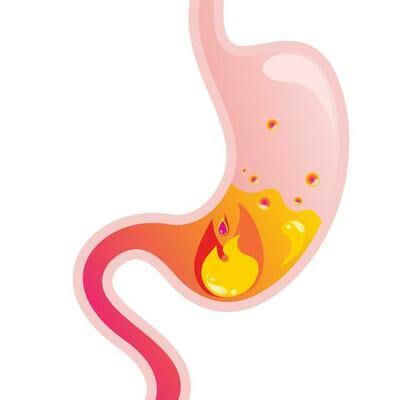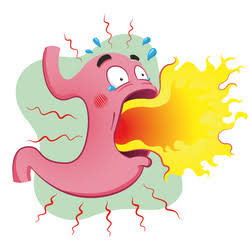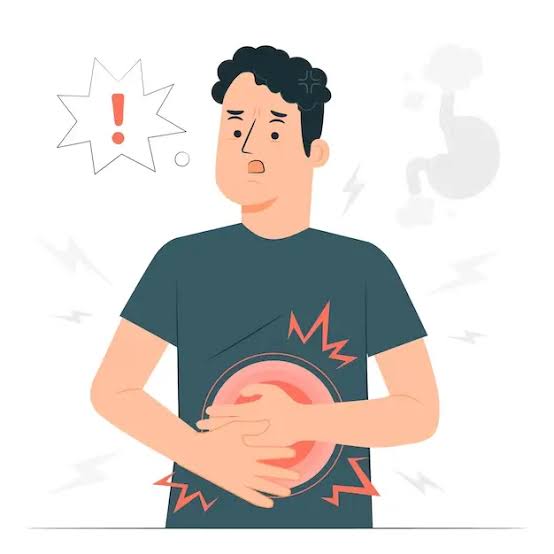Millions of individuals worldwide suffer from the prevalent gastrointestinal ailment known as gastroesophageal reflux disease (GERD). Comprehending the fundamentals of gastroenteritis is essential for efficiently controlling and averting its symptoms.

What is GERD?
Gastroesophageal reflux disease, or GERD for short, is a chronic illness that causes irritation and pain in the esophagus by allowing partially digested food and stomach acid to reflux back into it. Other names for this illness include acid indigestion, heartburn, and acid reflux.
The Pathology of GERD
Food can go down the esophagus in the human digestive tract from the mouth to the stomach. The lower esophageal sphincter (LES), a ring of muscles, functions as a one-way valve to stop food from returning to the esophagus. The LES weakens or relaxes improperly in those with GERD, allowing stomach acid to reflux into the esophagus.
The Different Types of GERD
1. Non-Erosive Reflux Disease (NERD): Although the lining of the esophagus is not visibly damaged, this kind of GERD can nevertheless cause symptoms and pain.
2. Erosive Esophagitis: Constant exposure to stomach acid causes inflammation and destruction of the esophageal lining in this kind of esophagitis.
3. Barrett’s Esophagus: A more severe variation of GERD that raises the risk of esophageal cancer by altering the lining of the esophagus.
The Various Stages of GERD
GERD can develop in phases according to the frequency and intensity of symptoms:
1. Mild: Periodic symptoms of acid reflux or heartburn.
2. Moderate: Frequent symptoms that could call for over-the-counter medicines.
3. Severe: Prolonged, severe symptoms that, if untreated, could have negative effects.
Identifying the Causes of GERD
Understanding the root causes associated with GERD is essential in its management and prevention.
1. Hiatal Hernia: This condition weakens the LES and causes GERD when the upper portion of the stomach pushes through the diaphragm and into the chest.
2. Obesity: Carrying too much weight can raise belly pressure and force food back up the esophagus.
3. Pregnancy: GERD can be brought on by hormonal fluctuations and elevated abdominal pressure during pregnancy.
4. Smoking: Smoking relaxes the LES and increases acid reflux.
5. Specific Foods: Alcohol, caffeine, and spicy, fatty, and acidic foods can all make GERD symptoms worse.
The Risk Factors of GERD
Although GERD can strike anyone, the following factors raise the risk:
1. Age: Adults, particularly those over 40, are more likely to have GERD.
2. Family History: Having GERD in your family may make you more susceptible.
3. Pregnancy: Because of hormonal changes, pregnant women are more likely to experience GERD.
4. Obesity: Carrying too much weight around increases your risk.
Recognizing GERD
Identifying the signs and symptoms of GERD is crucial for early diagnosis and effective management.
1. Heartburn: A burning feeling in the chest that usually occurs after eating or sleeping.
2. Difficulty Swallowing: Also referred to as dysphagia, this condition may indicate severe GERD.
3. Chest Pain: A chest ache or discomfort that is occasionally misdiagnosed as a heart attack.
4. Chronic Cough: A cough that lasts a long time and gets worse at night.
5. Hoarseness: Vocal cord inflammation resulting in changes to the voice.
6. Sore Throat: Acid reflux causing recurring sore throats.
Identifying GERD
1. Endoscopy: To inspect and identify any injury or inflammation in the esophagus, a flexible tube equipped with a camera is utilized.
2. Esophageal pH Monitoring: This technique gauges the amount of acid in the esophagus over the course of a day in order to establish the frequency and intensity of acid reflux symptoms.
Managing GERD
Managing GERD effectively involves lifestyle modifications, medications, and in some cases, alternative therapies like homeopathy.
1. Lifestyle Adjustments:
– Keep a healthy weight.
– Raise the head of your bed to lessen reflux during the night.
– Steer clear of heavy meals, particularly right before bed.
– If you smoke, give it up.
2. Medication:
– Antacids sold over-the-counter may offer momentary relief.
– H2 blockers and proton pump inhibitors (PPIs) lessen the production of stomach acid and provide long-term symptom alleviation.
3. Surgical Options:
– To strengthen the LES or treat a hiatal hernia, surgery might be advised in extreme circumstances.
General Prevention of GERD
Developing healthy behaviors and minimizing risk factors are key to GERD prevention:
1. Dietary Choices:
– Choose a diet high in fruits, vegetables, and whole grains that is balanced.
– Steer clear of alcohol, coffee, and trigger foods.
2. Weight Management:
– To lessen pressure in the abdomen, maintain a healthy weight.
3. Cessation of Smoking:
– Give up smoking to enhance LES performance and general well-being.
4. Stress Management:
– Use calming methods to reduce stress, such as yoga or meditation.
Homeopathy and GERD
Homeopathy has become more well-liked as an alternative medicine due to its all-encompassing approach to wellness. Although there is not much scientific proof to support homeopathy’s effectiveness in treating GERD, some people report success with it.
Understanding Homeopathy
Homeopathy is a medical technique that stimulates the body’s self-healing capabilities by using greatly diluted natural chemicals. Based on the idea of “like heals like,” a highly diluted version of a chemical that causes symptoms in a healthy person is used to treat comparable symptoms in a sick person.
Homeopathic Remedies for GERD
Depending on the individual’s symptoms and constitution, a number of homeopathic medicines for GERD may be taken into consideration. These include:
1. Nux Vomica: This remedy is used for people who experience heartburn, bloating, and a feeling of abdominal fullness after eating.
2. Pulsatilla: Suggested for people who regurgitate frequently, particularly when they are sleeping.
3. Lycopodium: Good for people who have heartburn, flatulence, and a feeling of fullness in the tummy.
4. Robinia: Excellent for children’s acidity, greenish vomiting, searing stomach aches at night, and extremely caustic eructations associated with GERD. It is recommended to take three to five pills of 3C potency three times a day.
5. Iris Versicolor: Suitable for GERD symptoms such as burning in the gastrointestinal system, sour vomiting that is frequently bloody or biliary, and excessive salivation. Particularly when sleeping, symptoms can get worse in the evening and at night. Usually given three times a day as ten drops in half a glass of water.
6. Natrum Phosphorica: Helpful for greenish diarrhea, sour vomiting, and sour eructations associated with GERD. It is also applied to the back of the tongue and mouth when there is a creamy yellow coating. Three pills, three times a day is the typical dosage for natrum phosphorica, which comes in potencies ranging from three to twelve times.
7. Arsenicum Album: Suitable for GERD, which is typified by heartburn, searing discomfort, a desire for acidic meals and coffee, and the feeling of swallowing bitter and acidic things that irritate the throat. Warmth relieves symptoms, but cold beverages may make them worse. Generally, it is advised to take three pills of arsenicum album, with potencies varying from 3C to 30C, three times a day.
8. Sulphuricum Acidum: Usually generating discomfort similar to putting one’s teeth on edge, this medication is indicated for GERD with heartburn, sour eructations, and sour vomiting. Excessive heat or cold, particularly in the afternoon and evening, might exacerbate symptoms. Often, using heat and resting on the afflicted side will provide relief. It is suggested to take three to five pills, with a potency range of 3C to 30C, three times a day.
9. Carbo Vegetalis: This is a good option for people who get burning feelings in their stomach that radiate down their back and spine. Putrid, sour, or rancid eructations are common, especially after meals and beverages. When there is momentary relief from belching and an intolerance to milk, meat, and fatty foods, this therapy is frequently recommended. Three pills in potencies ranging from 3C to 30C, three times a day, is the suggested dosage.

Conclusion: Let’s Heal Together!
The prevalent disorder known as gastroesophageal reflux disease (GERD) comes in several forms and phases. For an early diagnosis and successful treatment, determining the condition’s causes, risk factors, indicators, and symptoms is essential. Even though homeopathy takes a holistic approach to health and can help GERD patients, it is important to speak with a doctor for a customized treatment plan.
Changes in lifestyle, medicine, and even surgery are all part of managing and preventing GERD. You may lessen the effects of GERD on your life and enhance your general well-being by implementing good lifestyle choices, eating a balanced food, and keeping a healthy weight.
Keep in mind that the material on this page is meant only for educational reasons. For a thorough assessment and individualized treatment plan catered to your unique requirements and situation, you must speak with a healthcare provider.
Reach out to us for a Consultation.
This blog is for information purposes. It’s crucial to note that while homeopathy is a centuries-old practice with many adherents worldwide, always consult a qualified homeopath or medical professional before initiating any treatment.
For any queries, reach out to us at contact@homeopathic.ai







